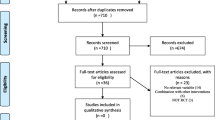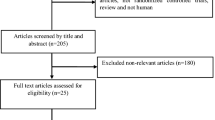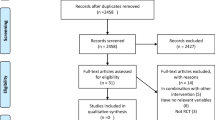Abstract
Background
The effects of coenzyme Q10 (CoQ10) supplementation in chronic kidney disease (CKD) patients remain controversial.
Objective
A systematic review of current evidence was performed to systematically and comprehensively summarize the effects of CoQ10 on cardiovascular outcomes, oxidative stress, inflammation, lipid profiles, and glucose metabolism.
Methods
MEDLINE, EMBASE, and the Cochrane Library database (Cochrane Central Register of Controlled Trials) were searched to identify eligible studies investigating the effects of CoQ10 supplementation on patients with CKD.
Results
Twelve independent studies (including seventeen publications) were included in this systematic review. For CKD patients, six studies reported variable cardiovascular outcomes, which yielded inconsistent results. Regarding oxidative stress and inflammation, pooled analysis showed that CoQ10 supplementation significantly reduced malonaldehyde (WMD: − 1.15 95% CI − 1.48 to − 0.81) and high-sensitivity C reactive protein levels (WMD: − 1.18 95% CI − 2.21 to − 0.15). Regarding glucose metabolism, we found that CoQ10 supplementation resulted in significant improvements in HbA1c (WMD: − 0.80; 95% CI: − 1.35 to − 0.24) and QUICKI (WMD: 0.02; 95% CI: 0.01 to 0.03). The pooled results indicated that CoQ10 supplementation had no effects on total cholesterol, or LDL-cholesterol, or on HDL-cholesterol, and triglycerides.
Conclusions
Our systematic review demonstrated that CoQ10 supplementation might have promising effects on oxidative stress. This work provided some clues that CoQ10 supplementation might have the potential to improve inflammation levels, glucose metabolism, cardiac structure, and cardiac biomarkers. However, the effects of CoQ10 supplementation should be confirmed in larger high-quality studies.



Similar content being viewed by others
Data availability
The datasets used and/or analyzed during the current study are available from the corresponding author on reasonable request.
Code availability
The code used in this paper are available from the corresponding author on reasonable request.
Abbreviations
- CKD:
-
Chronic kidney disease
- CoQ10:
-
Coenzyme Q10
- FPG:
-
Fasting plasma glucose
- HbA1c:
-
Hemoglobin A1c
- HDL:
-
High-density lipoprotein
- hs-CRP:
-
High sensitivity C-reactive protein
- HOMA-B:
-
Homeostatic model assessment for B-cell function
- HOMA-IR:
-
Homeostasis model assessment of insulin resistance
- LDL:
-
Low-density lipoprotein
- MDA:
-
Malonaldehyde
- NT-pro-BNP:
-
N-terminal pro-B-type natriuretic peptide
- PPAR-γ:
-
Peroxisome proliferator-activated receptor-γ
- PRISMA:
-
Preferred reporting items for systematic reviews and meta-analyses
- QUICKI:
-
Quantitative insulin sensitivity check index
- VLDL:
-
Very low-density lipoprotein
References
Jankowski J, Korzeniowska K, Cieslewicz A, Jablecka A (2016) Coenzyme Q10—a new player in the treatment of heart failure? Pharmacol Rep 68(5):1015–1019. https://doi.org/10.1016/j.pharep.2016.05.012
Liakopoulos V, Roumeliotis S, Gorny X, Eleftheriadis T, Mertens PR (2017) Oxidative stress in patients undergoing peritoneal dialysis: a current review of the literature. Oxid Med Cell Longev 2017:3494867. https://doi.org/10.1155/2017/3494867
Martelli A, Testai L, Colletti A, Cicero AFG (2020) Coenzyme Q(10): clinical applications in cardiovascular diseases. Antioxidants (Basel). https://doi.org/10.3390/antiox9040341
Arenas-Jal M, Suñé-Negre JM, García-Montoya E (2020) Coenzyme Q10 supplementation: efficacy, safety, and formulation challenges. Compr Rev Food Sci Food Saf 19(2):574–594. https://doi.org/10.1111/1541-4337.12539
Tsai KL, Huang YH, Kao CL, Yang DM, Lee HC, Chou HY, Chen YC, Chiou GY, Chen LH, Yang YP, Chiu TH, Tsai CS, Ou HC, Chiou SH (2012) A novel mechanism of coenzyme Q10 protects against human endothelial cells from oxidative stress-induced injury by modulating NO-related pathways. J Nutr Biochem 23(5):458–468. https://doi.org/10.1016/j.jnutbio.2011.01.011
Liakopoulos V, Roumeliotis S, Zarogiannis S, Eleftheriadis T, Mertens PR (2019) Oxidative stress in hemodialysis: causative mechanisms, clinical implications, and possible therapeutic interventions. Semin Dial 32(1):58–71. https://doi.org/10.1111/sdi.12745
Rysz J, Franczyk B, Lawinski J, Gluba-Brzozka A (2020) Oxidative stress in ESRD patients on dialysis and the risk of cardiovascular diseases. Antioxidants (Basel). https://doi.org/10.3390/antiox9111079
Liakopoulos V, Roumeliotis S, Gorny X, Dounousi E, Mertens PR (2017) Oxidative stress in hemodialysis patients: a review of the literature. Oxid Med Cell Longev 2017:3081856. https://doi.org/10.1155/2017/3081856
Kawashima C, Matsuzawa Y, Konishi M, Akiyama E, Suzuki H, Sato R, Nakahashi H, Kikuchi S, Kimura Y, Maejima N, Iwahashi N, Hibi K, Kosuge M, Ebina T, Tamura K, Kimura K (2019) Ubiquinol improves endothelial function in patients with heart failure with reduced ejection fraction: a single-center, randomized double-blind placebo-controlled crossover pilot study. Am J Cardiovasc Drugs. https://doi.org/10.1007/s40256-019-00384-y
Fotino AD, Thompson-Paul AM, Bazzano LA (2013) Effect of coenzyme Q(1)(0) supplementation on heart failure: a meta-analysis. Am J Clin Nutr 97(2):268–275. https://doi.org/10.3945/ajcn.112.040741
Mortensen SA, Rosenfeldt F, Kumar A, Dolliner P, Filipiak KJ, Pella D, Alehagen U, Steurer G, Littarru GP (2014) The effect of coenzyme Q10 on morbidity and mortality in chronic heart failure: results from Q-SYMBIO: a randomized double-blind trial. JACC Heart Failure 2(6):641–649. https://doi.org/10.1016/j.jchf.2014.06.008
Mehmetoglu I, Yerlikaya FH, Kurban S, Erdem SS, Tonbul Z (2012) Oxidative stress markers in hemodialysis and peritoneal dialysis patients, including coenzyme Q10 and ischemia-modified albumin. Int J Artif Organs 35(3):226–232. https://doi.org/10.5301/ijao.5000078
Gazdikova K, Gvozdjakova A, Kucharska J, Spustova V, Braunova Z, Dzurik R (2001) Oxidative stress and plasma concentrations of coenzyme Q10, alpha-tocopherol, and beta-carotene in patients with a mild to moderate decrease of kidney function. Nephron 88(3):285. https://doi.org/10.1159/000046007
Bakhshayeshkaram M, Lankarani KB, Mirhosseini N, Tabrizi R, Akbari M, Dabbaghmanesh MH, Asemi Z (2018) The effects of coenzyme Q10 supplementation on metabolic profiles of patients with chronic kidney disease: a systematic review and meta-analysis of randomized controlled trials. Curr Pharm Des. https://doi.org/10.2174/1381612824666181112112857
Xu Y, Liu J, Han E, Wang Y, Gao J (2019) Efficacy of coenzyme Q10 in patients with chronic kidney disease: protocol for a systematic review. BMJ Open 9(5):e029053. https://doi.org/10.1136/bmjopen-2019-029053
Moher D, Liberati A, Tetzlaff J, Altman DG (2009) Preferred reporting items for systematic reviews and meta-analyses: the PRISMA statement. Ann Intern Med 151(4):264–269. https://doi.org/10.7326/0003-4819-151-4-200908180-00135
Higgins JP, Altman DG, Gotzsche PC, Juni P, Moher D, Oxman AD, Savovic J, Schulz KF, Weeks L, Sterne JA (2011) The Cochrane Collaboration’s tool for assessing risk of bias in randomised trials. BMJ 343:d5928. https://doi.org/10.1136/bmj.d5928
Wells GA SB, O'Connell D, Peterson J, Welch V, Losos M, Tugwell P (2010) The Newcastle-Ottawa Scale (NOS) for assessing the quality of nonrandomized studies in meta-analysis. Ottawa, Canada: Department of Epidemiology and Community Medicine, University of Ottawa. http://www.ohri.ca/programs/clinical_epidemiology/oxford.asp
Riley RD, Kauser I, Bland M, Thijs L, Staessen JA, Wang J, Gueyffier F, Deeks JJ (2013) Meta-analysis of randomised trials with a continuous outcome according to baseline imbalance and availability of individual participant data. Stat Med 32(16):2747–2766. https://doi.org/10.1002/sim.5726
Higgins JPT, Chandler JTJ, Cumpston M, Li T, Page MJ, Welch VA (eds) (2019) Cochrane handbook for systematic reviews of interventions, 3rd edn. John Wiley & Sons, Chichester (UK)
Trowman R, Dumville JC, Torgerson DJ, Cranny G (2007) The impact of trial baseline imbalances should be considered in systematic reviews: a methodological case study. J Clin Epidemiol 60(12):1229–1233. https://doi.org/10.1016/j.jclinepi.2007.03.014
Aiello F, Attanasio M, Tine F (2011) Assessing covariate imbalance in meta-analysis studies. Stat Med 30(22):2671–2682. https://doi.org/10.1002/sim.4311
Elbourne DR, Altman DG, Higgins JP, Curtin F, Worthington HV, Vail A (2002) Meta-analyses involving cross-over trials: methodological issues. Int J Epidemiol 31(1):140–149. https://doi.org/10.1093/ije/31.1.140
Borenstein M, Hedges LV, Higgins JP, Rothstein HR (2010) A basic introduction to fixed-effect and random-effects models for meta-analysis. Res Synth Methods 1(2):97–111. https://doi.org/10.1002/jrsm.12
DerSimonian R, Laird N (1986) Meta-analysis in clinical trials. Control Clin Trials 7(3):177–188. https://doi.org/10.1016/0197-2456(86)90046-2
Higgins JP, Thompson SG, Deeks JJ, Altman DG (2003) Measuring inconsistency in meta-analyses. BMJ 327(7414):557–560. https://doi.org/10.1136/bmj.327.7414.557
Egger M, Davey Smith G, Schneider M, Minder C (1997) Bias in meta-analysis detected by a simple, graphical test. BMJ 315(7109):629–634. https://doi.org/10.1136/bmj.315.7109.629
Begg CB, Mazumdar M (1994) Operating characteristics of a rank correlation test for publication bias. Biometrics 50(4):1088–1101
Fallah M, Askari G, Soleimani A, Feizi A, Asemi Z (2019) Clinical trial of the effects of coenzyme Q10 supplementation on biomarkers of inflammation and oxidative stress in diabetic hemodialysis patients. Int J Prev Med 10:12. https://doi.org/10.4103/ijpvm.IJPVM_418_18
Fallah M, Askari G, Soleimani A, Feizi A, Asemi Z (2018) Clinical trial of the effects of coenzyme Q10 supplementation on glycemic control and markers of lipid profiles in diabetic hemodialysis patients. Int Urol Nephrol 50(11):2073–2079. https://doi.org/10.1007/s11255-018-1973-z
Mori TA, Burke V, Puddey I, Irish A, Cowpland CA, Beilin L, Dogra G, Watts GF (2009) The effects of [omega]3 fatty acids and coenzyme Q10 on blood pressure and heart rate in chronic kidney disease: a randomized controlled trial. J Hypertens 27(9):1863–1872
Barden AE, Burke V, Mas E, Beilin LJ, Puddey IB, Watts GF, Irish AB, Mori TA (2015) n-3 fatty acids reduce plasma 20-hydroxyeicosatetraenoic acid and blood pressure in patients with chronic kidney disease. J Hypertens 33(9):1947–1953. https://doi.org/10.1097/HJH.0000000000000621
Barden A, O’Callaghan N, Burke V, Mas E, Beilin LJ, Fenech M, Irish AB, Watts GF, Puddey IB, Huang RC, Mori TA (2016) n-3 fatty acid supplementation and leukocyte telomere length in patients with chronic kidney disease. Nutrients 8(3):175. https://doi.org/10.3390/nu8030175
Barden AE, Shinde S, Burke V, Puddey IB, Beilin LJ, Irish AB, Watts GF, Mori TA (2018) The effect of n-3 fatty acids and coenzyme Q10 supplementation on neutrophil leukotrienes, mediators of inflammation resolution and myeloperoxidase in chronic kidney disease. Prostaglandins Other Lipid Mediat 136:1–8. https://doi.org/10.1016/j.prostaglandins.2018.03.002
Mas E, Barden A, Burke V, Beilin LJ, Watts GF, Huang RC, Puddey IB, Irish AB, Mori TA (2016) A randomized controlled trial of the effects of n-3 fatty acids on resolvins in chronic kidney disease. Clin Nutr 35(2):331–336. https://doi.org/10.1016/j.clnu.2015.04.004
Turk S, Baki A, Solak Y, Kayrak M, Atalay H, Gaipov A, Aribas A, Akilli H, Biyik Z, Okudan N, Gokbel H (2013) Coenzyme Q10 supplementation and diastolic heart functions in hemodialysis patients: a randomized double-blind placebo-controlled trial. Hemodial Int 17(3):374–381. https://doi.org/10.1111/hdi.12022
Rivara MB, Yeung CK, Robinson-Cohen C, Phillips BR, Ruzinski J, Rock D, Linke L, Shen DD, Ikizler TA, Himmelfarb J (2017) Effect of coenzyme Q10 on biomarkers of oxidative stress and cardiac function in hemodialysis patients: the CoQ10 biomarker trial. Am J Kidney Dis 69(3):389–399. https://doi.org/10.1053/j.ajkd.2016.08.041
Kirigaya H (1983) The effect of coenzyme-Q10 on the electrocardiographic ST-segment depression in patients undergoing chronic hemodialysis. Second Asian Pacific Congress of Nephrology, p 45
Gokbel H, Turk S, Okudan N, Atalay H, Belviranli M, Gaipov A, Solak Y (2016) Effects of coenzyme Q10 supplementation on exercise performance and markers of oxidative stress in hemodialysis patients: a double-blind placebo-controlled crossover trial. Am J Ther 23(6):e1736–e1743. https://doi.org/10.1097/MJT.0000000000000166
Zahed NS, Ghassami M, Nikbakht H (2016) Effects of coenzyme Q10 supplementation on C-reactive protein and homocysteine as the inflammatory markers in hemodialysis patients; a randomized clinical trial. J Nephropathol 5(1):38–43. https://doi.org/10.15171/jnp.2016.07
Singh RB, Khanna HK, Niaz MA (2000) Randomized, double-blind placebo-controlled trial of coenzyme Q10 in chronic renal failure: discovery of a new role. J Nutr Environ Med 10(4):281–288. https://doi.org/10.1080/13590840020013266
Singh RB, Kumar A, Niaz MA, Singh RG, Gujrati S, Singh VP, Singh M, Singh UP, Taneja C, Rastogi SS (2003) Randomized, double-blind, placebo-controlled trial of coenzyme Q10 in patients with end-stage renal failure. J Nutr Environ Med 13(1):13–22. https://doi.org/10.1080/1359084031000095002
Gholnari T, Aghadavod E, Soleimani A, Hamidi GA, Sharifi N, Asemi Z (2018) The effects of coenzyme Q10 supplementation on glucose metabolism, lipid profiles, inflammation, and oxidative stress in patients with diabetic nephropathy: a randomized, double-blind, placebo-controlled trial. J Am Coll Nutr 37(3):188–193. https://doi.org/10.1080/07315724.2017.1386140
Heidari A, Hamidi G, Soleimani A, Aghadavod E, Asemi Z (2018) Effects of coenzyme Q10 supplementation on gene expressions related to insulin, lipid, and inflammation pathways in patients with diabetic nephropathy. Iran J Kidney Dis 12(1):14–21
Shojaei M, Djalali M, Khatami M, Siassi F, Eshraghian M (2011) Effects of carnitine and coenzyme Q10 on lipid profile and serum levels of lipoprotein(a) in maintenance hemodialysis patients on statin therapy. Iran J Kidney Dis 5(2):114–118
Judy WV, Stogsdill WW, Folkers K (1993) Myocardial preservation by therapy with coenzyme Q10 during heart surgery. Clin Investig 71(8 Suppl):S155-161
DiNicolantonio JJ, Bhutani J, McCarty MF, O’Keefe JH (2015) Coenzyme Q10 for the treatment of heart failure: a review of the literature. Open Heart 2(1):e000326. https://doi.org/10.1136/openhrt-2015-000326
Triolo L, Lippa S, Oradei A, De Sole P, Mori R (1994) Serum coenzyme Q10 in uremic patients on chronic hemodialysis. Nephron 66(2):153–156. https://doi.org/10.1159/000187793
Macunluoglu B, Kaya Y, Atakan A, Ari E, Kaspar C, Demir H, Alp HH, Asicioglu E, Kedrah AE (2013) Serum coenzyme Q10 levels are associated with coronary flow reserve in hemodialysis patients. Hemodial Int 17(3):339–345. https://doi.org/10.1111/hdi.12001
Gao JJ, Xu YX, Jia HP, Zhang L, Cao XY, Zuo XW, Cai GY, Chen XM (2021) Associations of coenzyme Q10 with endothelial function in hemodialysis patients. Nephrology (Carlton) 26(1):54–61. https://doi.org/10.1111/nep.13766
Sakata T, Furuya R, Shimazu T, Odamaki M, Ohkawa S, Kumagai H (2008) Coenzyme Q10 administration suppresses both oxidative and antioxidative markers in hemodialysis patients. Blood Purif 26(4):371–378. https://doi.org/10.1159/000135605
Liakopoulos V, Roumeliotis S, Bozikas A, Eleftheriadis T, Dounousi E (2019) Antioxidant supplementation in renal replacement therapy patients: is there evidence? Oxid Med Cell Longev 2019:9109473. https://doi.org/10.1155/2019/9109473
Jorat MV, Tabrizi R, Kolahdooz F, Akbari M, Salami M, Heydari ST, Asemi Z (2019) The effects of coenzyme Q10 supplementation on biomarkers of inflammation and oxidative stress in among coronary artery disease: a systematic review and meta-analysis of randomized controlled trials. Inflammopharmacology 27(2):233–248. https://doi.org/10.1007/s10787-019-00572-x
Himmelfarb J (2005) Relevance of oxidative pathways in the pathophysiology of chronic kidney disease. Cardiol Clin 23(3):319–330. https://doi.org/10.1016/j.ccl.2005.03.005
Popolo A, Autore G, Pinto A, Marzocco S (2013) Oxidative stress in patients with cardiovascular disease and chronic renal failure. Free Radic Res 47(5):346–356. https://doi.org/10.3109/10715762.2013.779373
Garcia-Bello JA, Gomez-Diaz RA, Contreras-Rodriguez A, Talavera JO, Mondragon-Gonzalez R, Sanchez-Barbosa L, Diaz-Flores M, Valladares-Salgado A, Gallardo JM, Aguilar-Kitsu A, Lagunas-Munoz J, Wacher NH (2014) Carotid intima media thickness, oxidative stress, and inflammation in children with chronic kidney disease. Pediatr Nephrol 29(2):273–281. https://doi.org/10.1007/s00467-013-2626-1
Drozdz D, Kwinta P, Sztefko K, Kordon Z, Drozdz T, Latka M, Miklaszewska M, Zachwieja K, Rudzinski A, Pietrzyk JA (2016) Oxidative stress biomarkers and left ventricular hypertrophy in children with chronic kidney disease. Oxid Med Cell Longev 2016:7520231. https://doi.org/10.1155/2016/7520231
Chien SJ, Lin IC, Hsu CN, Lo MH, Tain YL (2015) Homocysteine and arginine-to-asymmetric dimethylarginine ratio associated with blood pressure abnormalities in children with early chronic kidney disease. Circ J 79(9):2031–2037. https://doi.org/10.1253/circj.CJ-15-0412
Yilmaz MI, Saglam M, Caglar K, Cakir E, Sonmez A, Ozgurtas T, Aydin A, Eyileten T, Ozcan O, Acikel C, Tasar M, Genctoy G, Erbil K, Vural A, Zoccali C (2006) The determinants of endothelial dysfunction in CKD: oxidative stress and asymmetric dimethylarginine. Am J Kidney Dis 47(1):42–50. https://doi.org/10.1053/j.ajkd.2005.09.029
Tyagi N, Sedoris KC, Steed M, Ovechkin AV, Moshal KS, Tyagi SC (2005) Mechanisms of homocysteine-induced oxidative stress. Am J Physiol Heart Circ Physiol 289(6):H2649-2656. https://doi.org/10.1152/ajpheart.00548.2005
Eckardt KU, Bernhardt WM, Weidemann A, Warnecke C, Rosenberger C, Wiesener MS, Willam C (2005) Role of hypoxia in the pathogenesis of renal disease. Kidney Int Suppl 99:S46-51. https://doi.org/10.1111/j.1523-1755.2005.09909.x
Takashiba S, Van Dyke TE, Shapira L, Amar S (1995) Lipopolysaccharide-inducible and salicylate-sensitive nuclear factor(s) on human tumor necrosis factor alpha promoter. Infect Immun 63(4):1529–1534
Arroyo A, Kagan VE, Tyurin VA, Burgess JR, de Cabo R, Navas P, Villalba JM (2000) NADH and NADPH-dependent reduction of coenzyme Q at the plasma membrane. Antioxid Redox Signal 2(2):251–262. https://doi.org/10.1089/ars.2000.2.2-251
Fan L, Feng Y, Chen GC, Qin LQ, Fu CL, Chen LH (2017) Effects of coenzyme Q10 supplementation on inflammatory markers: a systematic review and meta-analysis of randomized controlled trials. Pharmacol Res 119:128–136. https://doi.org/10.1016/j.phrs.2017.01.032
Vafa M (2019) Can coenzyme Q10 supplementation effectively reduce human tumor necrosis factor-alpha and interleukin-6 levels in chronic inflammatory diseases? A systematic review and meta-analysis of randomized controlled trials. Pharmacol Res. https://doi.org/10.1016/j.phrs.2019.104290
Stojanovic M, Radenkovic M (2017) A meta-analysis of randomized and placebo-controlled clinical trials suggests that coenzyme Q10 at low dose improves glucose and HbA1c levels. Nutr Res 38:1–12. https://doi.org/10.1016/j.nutres.2016.12.001
Huang H, Chi H, Liao D, Zou Y (2018) Effects of coenzyme Q10 on cardiovascular and metabolic biomarkers in overweight and obese patients with type 2 diabetes mellitus: a pooled analysis. Diabetes Metab Syndr Obes: Targets Ther 11:875–886. https://doi.org/10.2147/dmso.S184301
Lee SK, Lee JO, Kim JH, Kim N, You GY, Moon JW, Sha J, Kim SJ, Lee YW, Kang HJ, Park SH, Kim HS (2012) Coenzyme Q10 increases the fatty acid oxidation through AMPK-mediated PPARalpha induction in 3T3-L1 preadipocytes. Cell Signal 24(12):2329–2336. https://doi.org/10.1016/j.cellsig.2012.07.022
Feige JN, Gelman L, Michalik L, Desvergne B, Wahli W (2006) From molecular action to physiological outputs: peroxisome proliferator-activated receptors are nuclear receptors at the crossroads of key cellular functions. Prog Lipid Res 45(2):120–159. https://doi.org/10.1016/j.plipres.2005.12.002
Funding
This study was supported in part by a grant (No. 19ZX47) from Chinese PLA Strategic Support Force Characteristic Medical Center (the 306th Hospital of the Chinese PLA).
Author information
Authors and Affiliations
Contributions
YX, JG and JL contributed in conception and design. GY, YX contributed to electronic search. YX and YW contributed in study selection and data collection. GY, YX, and XZ contributed in statistical analysis. YX, GY, EH and HY interpreted data. GY, YX, XZ, JG, and HJ drafted the initial and final manuscript. All authors approved the final version for submission. JG and HJ supervised the study.
Corresponding authors
Ethics declarations
Conflict of interest
Yongxing Xu, Guolei Yang, Xiaowen Zuo, Jianjun Gao, Huaping Jia, Enhong Han, Juan Liu, Yan Wang, and Hong Yan declare that they have no competing interests.
Additional information
Publisher's Note
Springer Nature remains neutral with regard to jurisdictional claims in published maps and institutional affiliations.
Supplementary Information
Below is the link to the electronic supplementary material.
Rights and permissions
About this article
Cite this article
Xu, Y., Yang, G., Zuo, X. et al. A systematic review for the efficacy of coenzyme Q10 in patients with chronic kidney disease. Int Urol Nephrol 54, 173–184 (2022). https://doi.org/10.1007/s11255-021-02838-2
Received:
Accepted:
Published:
Issue Date:
DOI: https://doi.org/10.1007/s11255-021-02838-2




